NightLase

Laser Treatment for Snoring & Sleep Apnea
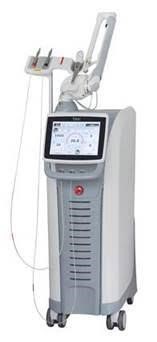 Charlotte dentist Dr. Charles Payet first added laser dentistry in 2009 with the Periolase Nd:YAG to treat gum disease with LANAP. He expanded his services as a laser dentist in 2014 with the Fotona Lightwalker Er:YAG laser for No-Shot, No-Drill fillings and Laser Root Canals. Leading the way yet again, Dr. Payet is now the first provider of both NightLase and SmoothLase Facial Rejuvenation procedures in Charlotte.
Charlotte dentist Dr. Charles Payet first added laser dentistry in 2009 with the Periolase Nd:YAG to treat gum disease with LANAP. He expanded his services as a laser dentist in 2014 with the Fotona Lightwalker Er:YAG laser for No-Shot, No-Drill fillings and Laser Root Canals. Leading the way yet again, Dr. Payet is now the first provider of both NightLase and SmoothLase Facial Rejuvenation procedures in Charlotte.
Dr. Payet understands the importance of good sleep, as he has sleep apnea himself. He vividly recalls his Dad snoring so loudly, his Mom often slept in another room. Ignoring sleep apnea and snoring has serious consequences, as his Dad discovered in his early 60’s. At that time, heart and lung issues from the strain of severe Obstructive Sleep Apnea put him in the hospital for a week. A CPAP made a tremendous difference for him, and he used it regularly until his passing in 2020. While Dr. Payet is a happy CPAP user, many patients can’t tolerate a CPAP.
NightLase treatment decreases snoring and improves your sleep quality. These result in a huge improvement in your energy levels, productivity, and how well you feel in general. Who knows? It might even save your marriage!
Important Note: NightLase is not intended to treat sleep apnea as a replacement for either a CPAP or oral appliance. However, NightLase therapy can improve the results you get with either, or even both a CPAP and an oral appliance. For more information on CPAP & Oral Appliance Therapy, please see our page on Sleep Apnea (coming soon)
Snoring is More than Annoying Noise
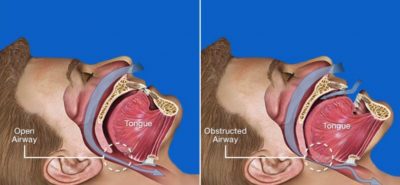
When your tongue partially blocks your airway, your body forces air through the constriction to breathe, causing the soft palate to vibrate. That vibration is snoring, and louder snoring equals more difficulty breathing. The harder it is to breathe, the lower your blood oxygen levels drop. Over time, decreased oxygen levels in your blood cause increased pressure on your hear. It has to work much harder to supply your body with enough oxygen.
Some patients with severe snoring actually stop breathing at night, if their tongue completely closes off the airway. This condition is called Obstructive Sleep Apnea (OSA), and it’s a major health risk, as people with it are at a much greater risk of heart attacks & strokes. Children also suffer from Sleep Disordered Breathing due to enlarged tonsils and adenoids. Symptoms of the condition in children include snoring, restless sleep, teeth grinding at night, frequent bed-wetting, and difficulty concentrating. In fact, ADHD is sometimes misdiagnosed in children who sleep poorly, because poor sleep impairs brain function.
If you snore, you have a higher risk of serious sleep breathing disorders.
At-Home Tests for Risk of Snoring & Sleep Apnea
There are 2 easy ways to check if snoring is negatively impacting your life: the Friedman Tongue Position and the Epworth Sleepiness Scale. Of course, your partner’s complaints may have already made it clear, just how disruptive your snoring is!
Friedman Tongue Position Diagram
The Friedman Tongue Position measures the position of the tongue relative to the other soft tissues in the back of the throat. Tongue size and position impact the size of your airway. You can check this for yourself with your bathroom mirror , as long as you have a bright light. Simply open your jaw, without straining, to look at the back of your mouth. Let your tongue relax and fall to the bottom of your mouth, then see where you fall on the following scale (use the diagram for reference).
- Position I: the entire uvula and tonsils/pillars are visible.
- Position II: the uvula is visible, but the tonsils aren’t.
- Position III: you can see the soft palate, but not the uvula.
- Position IV: only the hard palate, or roof of your mouth, is visible.
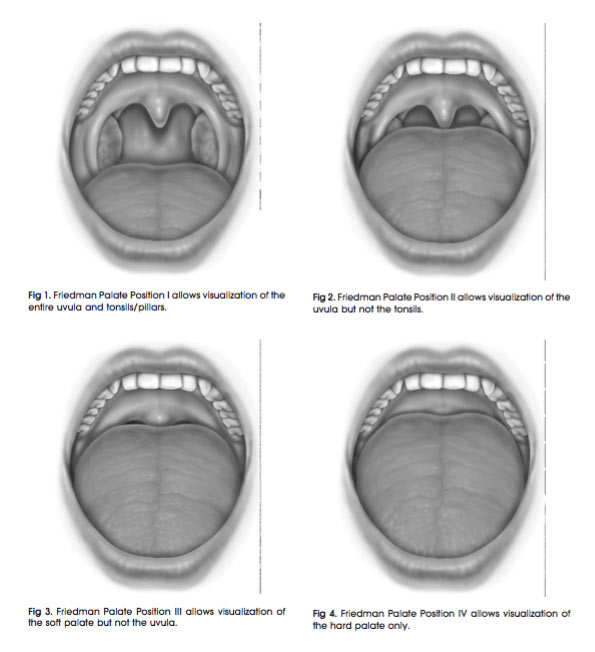
Positions III and IV highly correlate with increased risk of serious Obstructive Sleep Apnea.
Epworth Sleepiness Scale
The Epworth Sleepiness Scale is a simple test to measure how sleepy you are during the day. The test can be taken online here. Scoring of ten or higher means you may be suffering from a sleep disorder, which leads to poor sleep quality and being more tired during the day. If that’s the case, talk with your physician about getting a sleep test. Most medical insurances will pay for either an at-home test or a supervised test at a clinic.
Treatment for Snoring & Sleep Apnea
Until recently, physicians treated snoring and other sleep disorders with a type of breathing machine, called a CPAP. Dr. Payet absolutely loves his CPAP and won’t nap without it. His Dad was the same way, but many people find it impossible to sleep with a mask on their face, even the new small ones. There’s an invasive surgical intervention called an Uvulopalatopharyngoplasty (UPPP) , in which soft tissue from the back of the throat is cut out. Very few people want to go that far, and it doesn’t even work well.
Advances in technology and materials have led to much superior treatment choices – NightLase and Oral Appliances. Regardless of how you treat your snoring and/or OSA, you should undergo periodic sleep studies, to ensure your treatment is working.
NightLase Laser Snoring Treatment
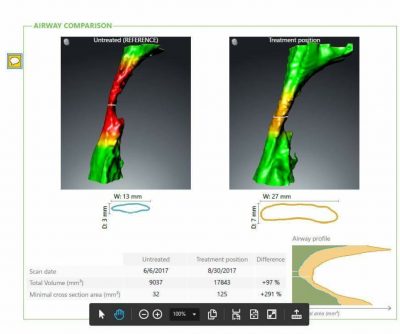 NightLase is a revolutionary out-patient treatment, which uses laser energy to tighten & tone your soft palate, thus opening your airway. With a larger airway, your tongue is less likely to block it off at night, so you snore less. NightLase stimulates the tissues using a photothermal effect, triggering protein transformation in the collagen fibers, causing the tissues to tighten & creating more space in the throat for breathing. Because the laser is operating with only moderate energy at temperatures around 40-48°C, there is no ablation of cells. It feels like a fine mist of hot water is being sprayed into the throat, so patients are generally surprised at how painless the NightLase procedure is. No anesthetic is needed, so you can talk, eat and drink normally once the procedure is over, and there’s no downtime from work or school.
NightLase is a revolutionary out-patient treatment, which uses laser energy to tighten & tone your soft palate, thus opening your airway. With a larger airway, your tongue is less likely to block it off at night, so you snore less. NightLase stimulates the tissues using a photothermal effect, triggering protein transformation in the collagen fibers, causing the tissues to tighten & creating more space in the throat for breathing. Because the laser is operating with only moderate energy at temperatures around 40-48°C, there is no ablation of cells. It feels like a fine mist of hot water is being sprayed into the throat, so patients are generally surprised at how painless the NightLase procedure is. No anesthetic is needed, so you can talk, eat and drink normally once the procedure is over, and there’s no downtime from work or school.
Dentists trained in NightLase use the laser to target the anterior pillar area, soft palate, uvula, hard palate, posterior pillars and tonsils and the lateral and bottom area of the tongue. Most patients need 3-4 sessions, about 3 weeks apart, and each session is about 20 minutes. Dr. Payet only recommends a 4th treatment for truly severe OSA cases.
The effect of each session is cumulative, so you’ll notice a bigger difference after the 2nd session than the first, and even more after the 3rd or 4th.
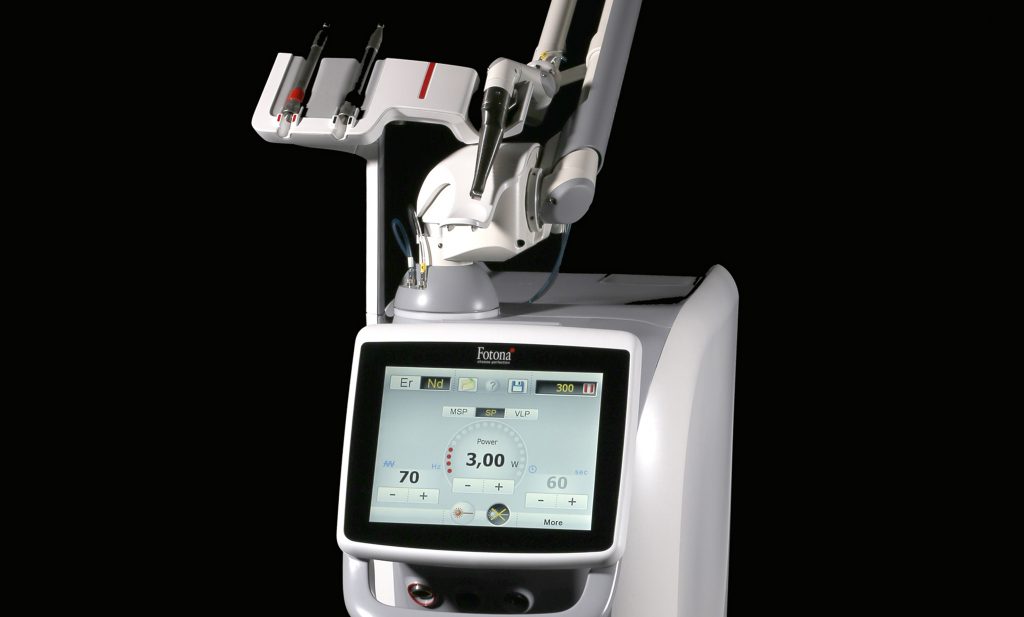
Studies Prove that NightLase Really Works
Clinical studies have shown NightLase works extremely well. The average snoring severity score over 50% after just 2 NightLase sessions. The same study demonstrated 95% of patients noticed a decrease in their snoring. Almost 60% said that the results were significant or excellent. A third study found that more than 80% of NightLase patients in a 3rd study said they breathed better throughout the day and had increased alertness and improved focus. Best of all, 85% of those who completed all 3 sessions reported the results were still positive 3 years later.
For more information about the NightLase snoring treatment Call Us NOW or Request a Complimentary Consultation today.






